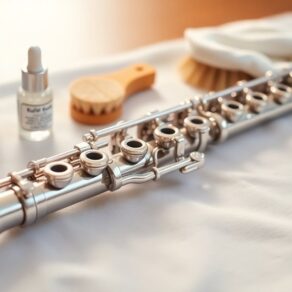You should take your flute to a professional repair shop if you notice visible damage, like cracks or dents, which can affect sound quality. If you hear unusual sounds, such as clicking or popping, this might indicate mechanical issues requiring attention. Also, if you struggle with inconsistent tuning or note production, a professional evaluation is essential. Regular maintenance checks are crucial, but persistent problems signal deeper issues. By recognizing these signs early, you can prevent further damage and enhance your instrument's performance. Explore more about maintaining your flute and when to seek help from experts.
Key Takeaways
- Take your flute to a professional if you notice visible damage like cracks or dents affecting sound quality.
- If pads show signs of wear or discoloration, it may lead to air leaks requiring expert attention.
- Unusual sounds such as clicking or squeaking during play indicate mechanical issues needing a technician's evaluation.
- Difficulty in producing notes or inconsistent tone quality suggests it's time for a professional assessment.
- Frequent repairs may signal underlying problems, warranting a thorough evaluation by a qualified repair technician.
Common Signs of Damage
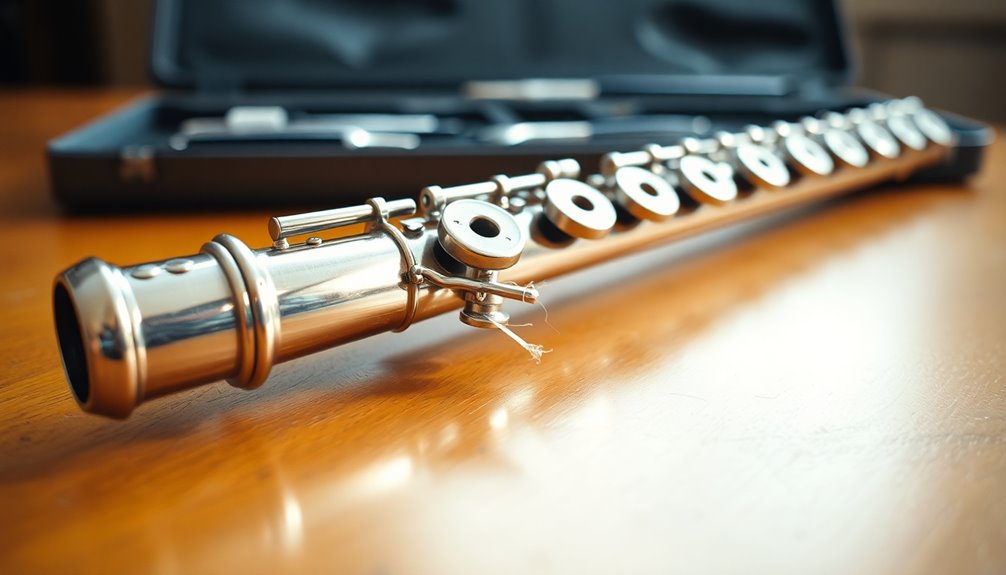
When you play your flute regularly, it's important to be aware of common signs of damage that may indicate it's time for a repair. First, check for visible cracks or dents on the body, as these can affect the instrument's overall integrity and sound production.
Next, inspect the pads; if they appear worn or discolored, they may not seal properly, leading to air leaks. Additionally, listen for any unusual noises when you play, such as clicking or popping, which can signal mechanical issues.
Flute maintenance is vital. Regularly cleaning and adjusting your instrument can prevent many problems, but even with diligent care, you might need repairs. If you notice any of the signs mentioned, consider the repair frequency that your flute requires. Frequent issues could suggest underlying problems that need professional attention.
Finally, don't hesitate to take your flute to a qualified technician when you spot potential damage. Being proactive not only guarantees your instrument remains in top condition but also enhances your playing experience within the community of fellow musicians. Additionally, investing in quality flute care products can help prolong the life of your instrument and reduce the need for frequent repairs.
Keep your flute in shape, and it will reward you with beautiful music for years to come.
Issues With Sound Quality
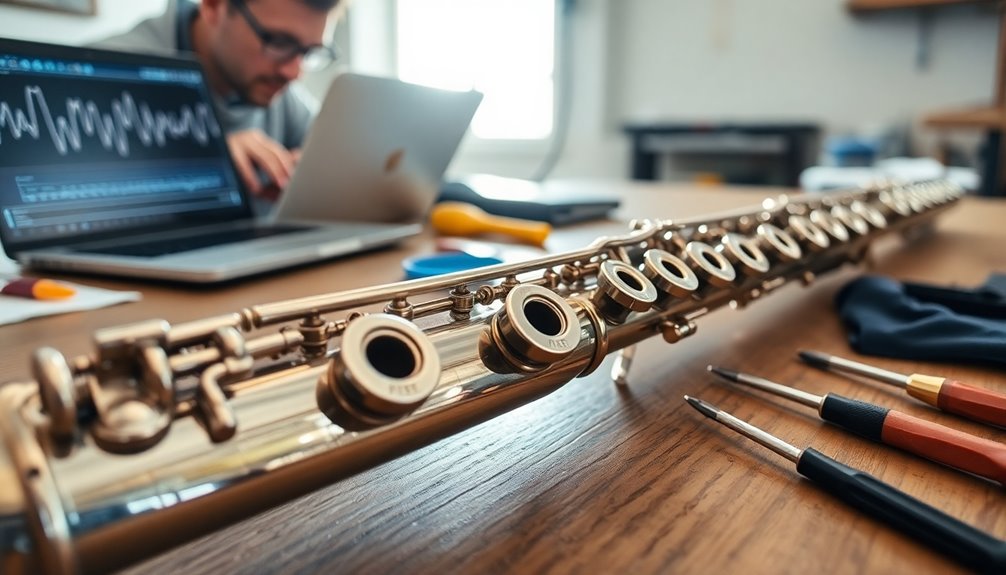
Noticing issues with sound quality can be a clear indicator that your flute needs attention. When your tone becomes inconsistent or lacks vibrancy, it may be time to seek professional help. One common culprit is a need for tone adjustment. A skilled technician can assess your flute's setup and make precise alterations to enhance your sound, ensuring that each note resonates clearly.
You might also experience embouchure issues, which can greatly affect your tone. If you find that your sound lacks richness or is overly breathy, your embouchure may require refinement. Understanding the importance of airflow control can also help in diagnosing sound quality issues, as it plays a crucial role in achieving a balanced and clear tone.
While many players believe they can solve these problems through practice, sometimes the instrument itself can be the source of the issue.
If you're struggling to achieve the sound you desire, don't hesitate to consult a professional. They can't only help correct any technical flaws in your flute but also offer insights into improving your playing technique.
Sticky or Misaligned Keys
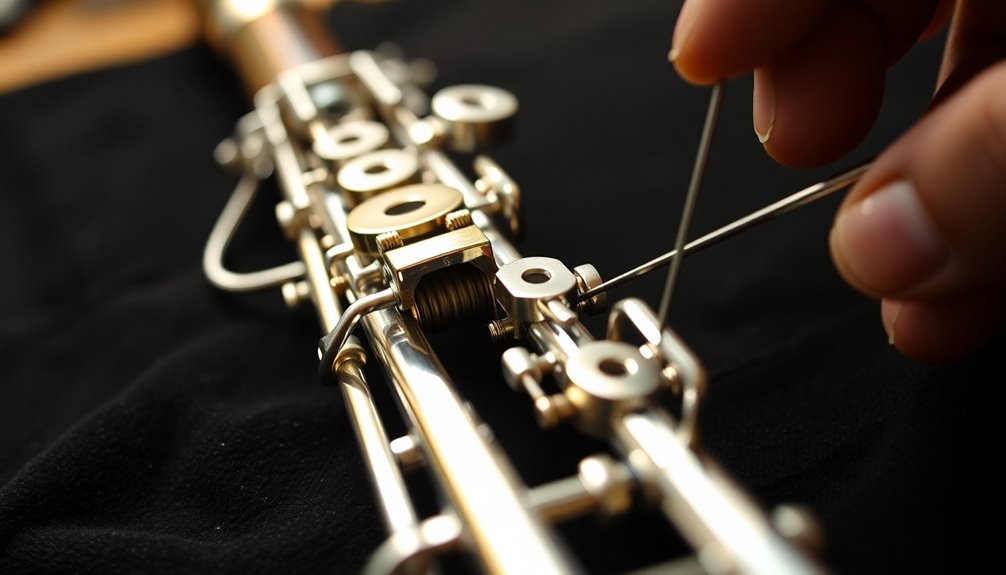
Your flute's keys are vital for smooth playability, and any stickiness or misalignment can disrupt your performance. If you notice your keys aren't responding correctly, it's time to examine the situation closely.
Here are four indicators that you should take your flute to a professional repair shop:
- Sticky Pads: If you feel resistance when pressing a key, sticky pads may be the culprit. They can accumulate moisture or debris, making them less effective.
- Key Alignment Issues: Misaligned keys can cause pads to not seal properly, leading to air leaks and poor sound quality. Check the mechanism for any visible misalignment.
- Inconsistent Action: If some keys feel different from others, this can indicate a problem with the action, making it challenging to play fluidly.
- Unusual Noises: Any rattling or clicking sounds when pressing keys can be a sign of loose parts or misalignment that needs urgent attention.
Addressing sticky or misaligned keys promptly guarantees your flute remains in top condition, allowing you to play with confidence and expressiveness. Regular maintenance practices, such as using a flute cleaning kit, can help prevent these issues from arising.
Don't hesitate to seek professional help when needed; it's a significant investment in your musical journey.
Dents and Physical Damage
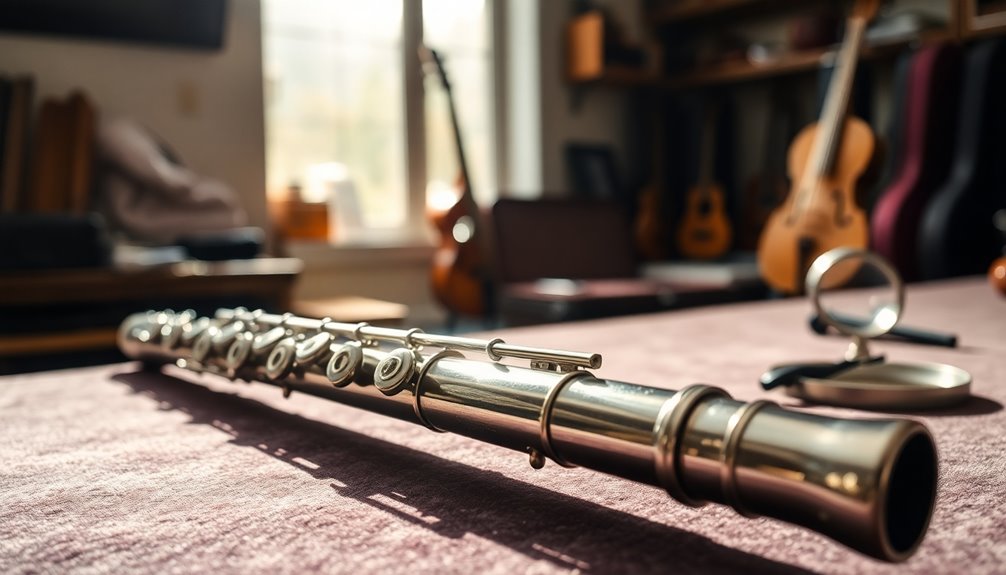
Dents and physical damage can severely impact your flute's performance and longevity. You might not realize it, but even minor dents can alter your flute's tonal quality and responsiveness. Common denting causes include accidental drops, improper handling, or even environmental factors. If you notice any physical damage, it's essential to assess the situation promptly.
| Impact of Dents | Signs to Look For | Recommended Actions |
|---|---|---|
| Reduced sound quality | Visible dents on the body | Schedule a professional repair |
| Difficulty playing notes | Keys misaligning | Consult with a technician |
| Increased wear and tear | Air leaks | Regular inspections advised |
Repair techniques vary depending on the extent of the damage and might involve dent removal or key realignment. While some minor issues can be resolved at home, significant dents require the expertise of a professional. Don't hesitate to reach out to a repair shop if you're unsure; your flute deserves the best care. Remember, attending to dents early can prevent further damage and guarantee that you continue to play beautifully with your instrument. Regular maintenance, such as routine inspections, is key to preserving your flute's sound quality and longevity.
Regular Maintenance Tips
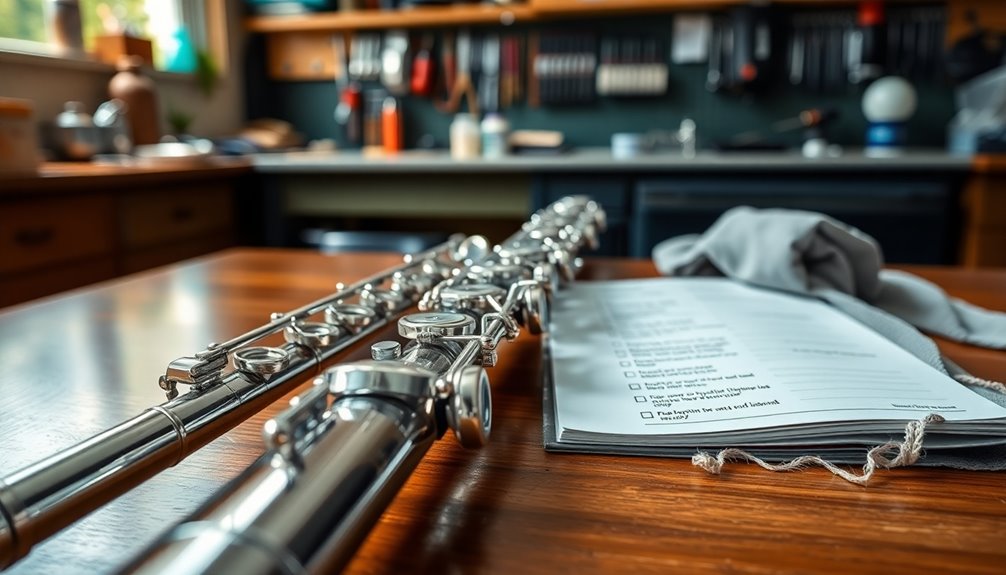
Regular maintenance is vital for keeping your flute in ideal playing condition. By adopting effective cleaning techniques and lubrication methods, you can enhance your instrument's longevity and performance.
Here are four important tips to follow:
- Daily Cleaning: After each use, wipe down the exterior with a soft cloth to remove moisture and oils. This helps prevent tarnishing and buildup.
- Swabbing the Interior: Use a swab or a cleaning rod with a microfiber cloth to clean the inside of the flute. This should be done after every playing session to eliminate moisture that can cause corrosion.
- Regular Inspection: Check for loose screws or pads that may need adjustment. Regular visual inspections can help you catch issues before they escalate.
- Lubrication: Use appropriate lubrication methods on the mechanism every few months, applying a small amount of key oil to the pivot points. This guarantees smooth operation and prevents wear. Additionally, regular cleaning not only enhances hygiene but also contributes to preserving the flute's quality and sound.
Choosing the Right Repair Shop
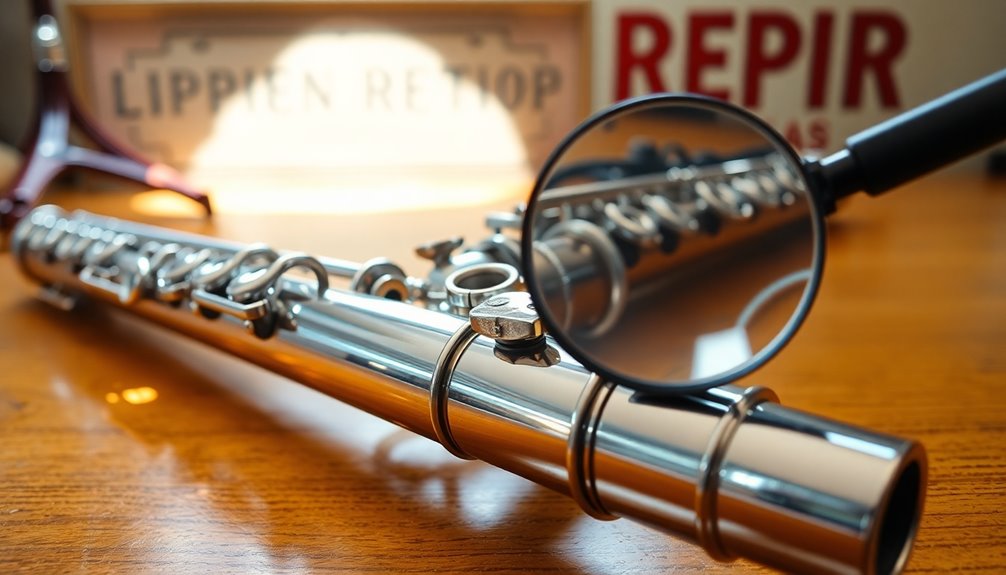
Finding the right repair shop for your flute can make a significant difference in its upkeep and overall performance. Start by checking the repair shop credentials. Look for shops with certified technicians who've experience specifically with flutes. A well-trained technician knows the intricacies of your instrument, ensuring precise adjustments and repairs.
Next, explore customer reviews. Online platforms and social media can provide insights into others' experiences. Positive feedback about a shop's workmanship, timeliness, and customer service can indicate reliability. Pay attention to how the shop handles complaints, as this reflects their commitment to quality.
Additionally, consider visiting the shop in person. Observe the environment; a clean, organized workshop often suggests professionalism. Engage with the staff; their willingness to answer your questions can reveal their expertise and genuine interest in helping you. Regular servicing by professionals is crucial for maintaining optimal performance and addressing any potential issues.
Lastly, don't forget to inquire about warranties or guarantees on repairs. A reputable shop stands behind their work, giving you added confidence in their services.
Frequently Asked Questions
How Often Should I Have My Flute Professionally Serviced?
You should have your flute professionally serviced at least once a year.
Regular maintenance helps prevent common flute problems, like sticky pads or misaligned keys. It's crucial to stay proactive; this way, you can prolong your instrument's life.
Incorporate flute maintenance tips into your routine, such as cleaning after each use and inspecting for wear.
Can I Fix Minor Issues Myself?
Sure, you could channel your inner handyman and tackle minor repairs yourself, but don't kid yourself—flutes aren't IKEA furniture!
DIY maintenance can be tempting, but it takes a skilled touch. If you can confidently tighten a screw or fix a pad, great!
However, remember that some issues require more finesse. So, weigh your confidence against your skills before diving in; your flute deserves better than a half-hearted attempt at repair.
What Should I Expect During a Repair Appointment?
During your repair appointment, you can expect a thorough assessment of your flute. The technician will explain the repair process step-by-step, ensuring you understand what's being done.
Typically, appointments last around 30 to 60 minutes, depending on the issues. You'll discuss any concerns you have, and the technician might offer maintenance tips to prevent future problems.
This collaborative experience helps you feel more connected to your instrument and its care.
How Much Do Professional Repairs Typically Cost?
Professional repair costs can vary widely, typically ranging from $50 to $300, depending on the complexity of the work.
Basic maintenance costs, like cleaning and minor adjustments, often fall on the lower end.
More extensive repairs, such as key replacement or major overhauls, can drive prices higher.
It's crucial to discuss repair pricing upfront with your technician to understand what you'll be investing in, ensuring you feel confident about the service you'll receive.
Will Repairs Affect My Flute's Resale Value?
Think of your flute like a classic car; its condition deeply affects its resale value.
When you make repairs, they can either enhance or detract from your instrument's appeal in the resale market. Quality repairs generally maintain or even improve value, while poor fixes might lead to depreciation.
Always consider how repairs align with the flute's overall condition, as potential buyers will scrutinize these details before making a purchase.
Conclusion
In conclusion, ignoring signs of damage on your flute is like allowing a maestro to perform with a broken baton. If you notice issues with sound quality, sticky keys, or any physical dents, don't hesitate to take your instrument to a professional repair shop. Regular maintenance can keep your flute in peak condition, but knowing when to seek expert help could mean the difference between a harmonious melody and a cacophony that makes ears bleed.





